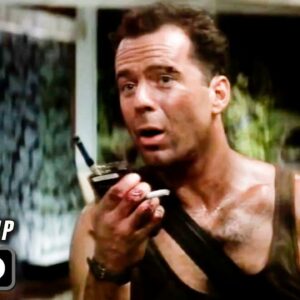In the summer of 1988, a movie exploded into theaters with such force that it would forever alter the course of Hollywood action cinema. That movie was Die Hard, directed by John McTiernan and starring Bruce Willis as the reluctant hero John McClane. What seemed like a typical high-stakes action flick quickly became something far more significant—a cultural touchstone that would re-define the action genre, spawning a legacy of imitators and setting new standards for film production and star power.
At the heart of this seismic shift was Bruce Willis, a relatively unknown TV actor who had yet to prove himself as a bankable movie star. His transition from a charming comedic TV role in Moonlighting to an international action star was as unexpected as it was groundbreaking. Die Hard not only propelled Willis to global fame but also had lasting effects on the way Hollywood approached action films, film budgets, and actor salaries. In the years following its release, Die Hard transformed the action genre from a gritty, testosterone-driven realm to something more dynamic, witty, and accessible.
Bruce Willis: A New Kind of Action Hero
Before Die Hard, the action genre was dominated by larger-than-life figures—muscle-bound stars like Arnold Schwarzenegger and Sylvester Stallone. These titans of action were revered for their physicality, their larger-than-life personas, and their sheer dominance on screen. The stories they inhabited were often as big and bold as their biceps: man vs. army, man vs. apocalypse, man vs. entire city of crime. Audiences went to theaters to see Arnold or Sly bulldoze through any opposition with brute strength and a few lines of dialogue. It was a formula that worked.
But Bruce Willis was different. A TV actor with a knack for comedy, Willis wasn’t the obvious choice for an action lead. Known primarily for his witty and playful banter on Moonlighting, Willis didn’t have the muscle mass or movie star gravitas that traditionally defined action heroes of the time. He was everyman, with his receding hairline, rumpled clothes, and a sense of vulnerability. This made him all the more relatable, especially in the role of John McClane, a New York cop thrown into a chaotic terrorist situation inside a Los Angeles skyscraper.
Willis’s McClane wasn’t invincible; he bled, he bruised, and he stumbled his way through the film’s intense set pieces. But it was precisely this sense of fallibility that made Die Hard so revolutionary. Willis’s wry sense of humor—combined with his visible exhaustion and his constant quips about his misfortune—brought a fresh and engaging twist to the genre. Audiences found themselves rooting for him not just as an unstoppable hero, but as a regular guy thrust into extraordinary circumstances.
Bruce Willis’s Unprecedented Salary for Die Hard
While Die Hard may have launched Bruce Willis into superstardom, the decision to cast him as John McClane came with a hefty price tag. At the time, Willis was hardly the first choice for the role. The studio initially considered more established action stars like Schwarzenegger and Stallone, both of whom turned down the offer. When it came time to finalize the casting, Willis’s name was brought up. But convincing the studio to back an actor who was largely known for his television work required a major financial gamble.
That gamble came in the form of a $5 million paycheck for Willis—an unheard-of sum for an actor of his stature at the time. Hollywood insiders were flabbergasted. How could a relatively unproven TV star command such a staggering fee for a genre that was typically dominated by established, muscle-bound names? The answer was simple: the studio saw in Willis a fresh face that could potentially reach a broader audience, particularly one that had been watching Moonlighting and would be curious to see how their favorite wise-cracking detective fared in an action role.
Willis’s $5 million salary wasn’t just a fluke; it was a harbinger of things to come in Hollywood, marking a pivotal moment when actor salaries began to skyrocket. For context, major action stars like Schwarzenegger and Stallone were making similar amounts, but they had the box office clout to back it up. With Willis’s unprecedented payday, the floodgates opened for other actors—especially those without an established blockbuster resume—to start commanding similarly astronomical figures.
Impact on Hollywood Salaries
Bruce Willis’s deal for Die Hard set a new precedent for Hollywood. Suddenly, actors found themselves in a position to demand higher salaries, even without having a proven track record in a particular genre. The willingness of studios to pay top dollar for relatively unproven talent led to an inflation of star salaries across the industry.
Actors who followed in Willis’s footsteps reaped the benefits. A few years later, Keanu Reeves earned an estimated $15 million for The Matrix trilogy, an incredible jump from his earlier work in more modest films like Speed. Similarly, Will Smith, who had started his career as a rapper and sitcom star, secured a reported $20 million payday for Men in Black—solidifying his status as a major Hollywood player.
This salary inflation wasn’t limited to the action genre, either. Comedic actors like Jim Carrey began earning comparable amounts for films like The Cable Guy, which netted him $20 million, despite it being outside the realm of blockbuster action fare. The success of actors like Willis in action films led to a ripple effect across genres, where the presence of a bankable star could drive up production budgets exponentially.
Long-Term Effects on the Film Industry
Willis’s trailblazing salary did more than just make headlines—it fundamentally changed the economics of film production. Suddenly, studios were forced to factor in exorbitant star salaries when budgeting their projects, especially for blockbuster films. This had both positive and negative effects on the industry.
On the positive side, bigger budgets allowed for more extravagant productions, particularly in the action genre. Films became increasingly elaborate in their special effects, stunts, and locations, as seen in the explosion of high-octane franchises like The Fast and the Furious and the Mission: Impossible series. Star power became a surefire way to attract audiences, with studios pouring more money into promoting the presence of their A-list talent.
But on the downside, these massive salaries sometimes resulted in bloated budgets that left little room for other creative elements. As a result, many mid-budget films—often the breeding ground for more experimental, indie-style movies—suffered. Studios shifted their focus toward big-budget spectacles designed to guarantee a return on investment, favoring established franchises and tentpole releases over more unique and riskier projects.
Additionally, the higher salaries for top actors led to a widening gap between the pay of A-list stars and other crew members, including writers, directors, and supporting actors. While the top talent could demand massive paychecks, others in the industry often struggled to negotiate for fair compensation.
Legacy of Bruce Willis and Die Hard
More than three decades after its release, Die Hard remains one of the most influential action films of all time, and its effects on Hollywood continue to be felt. Bruce Willis’s portrayal of John McClane revolutionized the action hero archetype, introducing vulnerability, humor, and a sense of humanity to a genre that had previously been dominated by stoicism and brute strength.
Willis’s career flourished in the wake of Die Hard, as he became synonymous with the action genre. He went on to star in numerous blockbusters, including Armageddon, Pulp Fiction, and the subsequent Die Hard sequels. While not every film reached the critical heights of his initial breakout, his enduring legacy as one of Hollywood’s leading action stars was cemented.
More importantly, Die Hard changed the DNA of modern action films. Its formula—a relatable everyman thrust into extraordinary circumstances—became the blueprint for countless action movies that followed. Films like Speed, Taken, and even the Bourne series owe a debt of gratitude to McClane’s unique brand of reluctant heroism.
In terms of actor salaries, the precedent set by Willis’s $5 million paycheck continued to ripple through the industry. Stars now regularly command eight-figure sums for leading roles, particularly in franchise films. While some lament the inflated budgets and star-driven nature of modern Hollywood, there’s no denying that Die Hard’s success paved the way for a new era of blockbuster filmmaking.
In the end, Die Hard wasn’t just a great action movie—it was a game-changer. And at the center of that change was Bruce Willis, whose career and salary broke barriers, reshaping Hollywood for generations to come.





